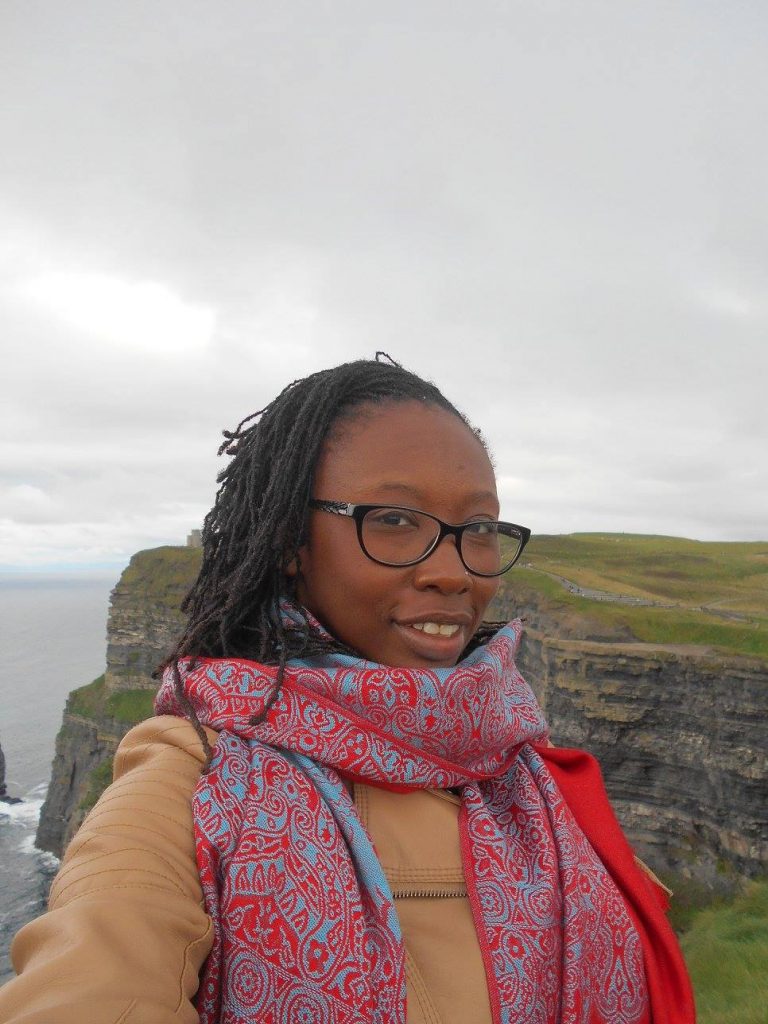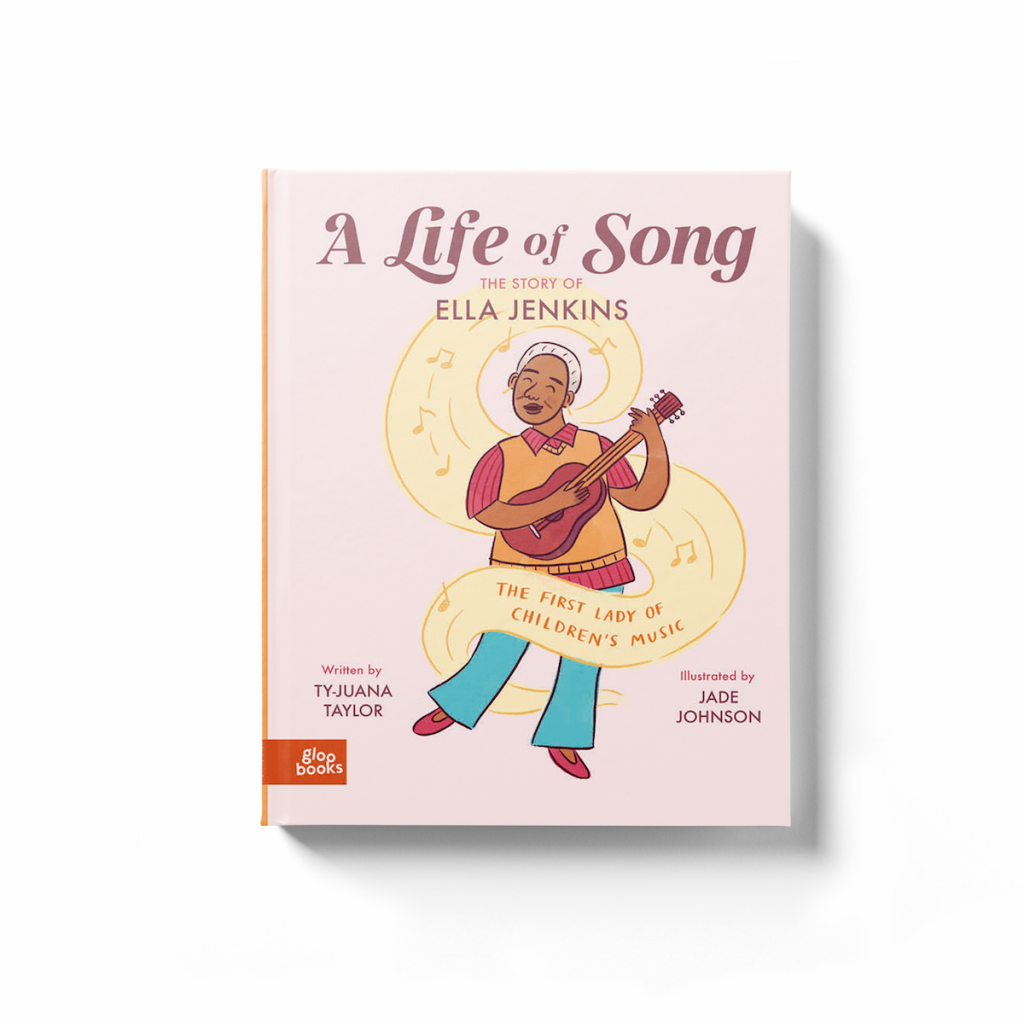
Ethnomusicologist, scholar, therapist, musician and debut children’s book author, Dr. Ty-Juana Taylor, talked to us about how she rediscovered the story of musician Ella Jenkins, what she’d tell her younger self and her journey into music history.
Please tell us a little about your new book, “A Life of Song: The Story of Ella Jenkins (The First Lady of Children’s Music).”
A Life of Song is a picture book about the musician Ella Jenkins. Readers will hopefully gain a better understanding of how Ms. Jenkins, a figure that so many love and have grown up with, developed into the dynamic woman that she is today. The book starts at childhood and then takes us on a journey of her life—highlighting her experience, how she overcame adversities, and the joy that she has—and shares—in making music.
What inspired you to write about Ella Jenkins?
I was working with Smithsonian Folkways on the creation of a new education initiative—Learning Pathways. I was responsible for the creation of the pathways on Women and the Blues and the Civil Rights Movement. While exploring the archives available through Folkways, I was reintroduced to Ms. Ella Jenkins. Through this project I began to learn of her significant role in the history of Folkways and her music, and began to incorporate her story and her work into the pathway that I was working on. I wanted the pathway to focus on figures who were crucial to the development and success of the Civil Rights movement, but seldom highlighted—like Ms. Ella Jenkins, Fannie Lou Hamer, Bernice Reagon Johnson, Diane Nash, etc.
I continued to dig and discover more about Ms. Jenkins through interviews with her (which included some singing!), her manager, and Tim Ferrin, as well as through the archives available from the History Makers Project. I learned that she was a member of the Student Nonviolent Coordinating Committee (SNCC) in Chicago and active in the Civil Rights Movement in her own right.
[Editor’s note: This research ended up in an article for Folkways celebrating Ms. Jenkins’ contribution to the Civil Rights Movement.]
Karen—founder of Gloo Books—found the article and approached me about writing the book. I had never written a children’s book before, just academic articles and chapters, but I was game. I agreed to pursue the project only with the permission of Ms. Jenkins and her manager. Once they gave permission, I continued my research, flew out to spend some time with Ms. Jenkins, and toured Chicago to view her old stomping grounds. (Thank you, Ms. Bernadelle Richter and Tim Ferrin, for showing me around!)
You got your Ph.D. in ethnomusicology from UCLA. Tell us a little about your background in music and education. What drew you to this work?
Similar to Lizzo, I wanted to be a professional flautist. I’ve performed music and studied flute for most of my life. However, unlike Lizzo, I was okay at flute, but not good enough to go pro (I figured that out while in music school). So, I pivoted and decided to focus on music history, since I love music and history.
My undergrad thesis focused on Negro spiritual, but I wanted to further study children’s music in West Africa (I was doing missionary work in Ghana). Through my research on children’s music, I discovered Ms. Ella Jenkins—the legendary music educator who brought music from her global travels into the classroom.
Because I wanted to study non-Western classical music, I decided Ethnomusicology was the route for me. I went to UCLA to pursue my PhD, focusing primarily on African American religious music and West African children’s music. My dissertation is based on seven years of research and field work in the Ivory Coast, Ghana, Nigeria, and Mali working with youth in different settings (both unhoused youth and youth receiving services from nonprofits).

What I found astonishing during my research was the continuous presence of music even in the darkest of spaces. The children who graciously agreed to share their stories and songs with me shared songs of all genres/styles spanning from lullabies recalled from infancy, to the newest popular tunes playing on the radio. When I returned home after months of fieldwork to analyze my data and complete additional research, Ms. Jenkins always came up. Although I was primarily focused on popular music, her songs and legacy were inescapable. I couldn’t talk about children and music without acknowledging Ms. Jenkins. And in many ways, she herself was an early ethnomusicologist—traveling the world, collecting songs and sharing them with others. That was the heart of our field initially. AND I couldn’t dismiss the work of a legendary Black woman, whose work and fearlessness has laid a path for so many. Helping to continue her legacy was what drew me to this work.
Did you have a mentor growing up? And what role did that person play in your life and your career?
I have amazing parents who have never completely understood what I do or how it makes money. But they have always been supportive, though they likely would describe me as the child who “teaches music, is somewhere in Africa, works with kids, and does therapy—at least one of those things.” Surprisingly, even though being a first-generation college student, my parents never made me conform to any box or expectation. I’m sure most of the things I did and do make no sense to them, but they have always encouraged me along the way. They attended every graduation, helped me move across the country, helped with nearly every move while in L.A., and provided support whenever and wherever they could. I never went without anything and was never discouraged during my unfamiliar and sometimes peculiar pursuits nor told to try something else more traditional.
In addition to my parents, my graduate advisor Jacqueline DjeDje always provided real and honest gems of wisdom. Dr. DjeDje has always, and to this day, continues to keep it 100%. She got me through my PhD program which was roughhhhhhh and suggested nontraditional routes for me after graduation—which I appreciate and am grateful for.
What would you tell your middle school self?
It seems like this is all that life has to offer you—and this option may look really sucky. Middle school is rough for most. Please remember: this is not the full stop. There’s so much more to life outside of middle school. AND GIRL you are taking yourself way too seriously! You are 12, enjoy the ride. You have no real responsibilities! Try to breathe and tell yourself whatever zit, break up, crush, and/ or school drama you have will pass. It may seem overwhelmingly serious now (and I would never want to minimize any child’s feelings) but they aren’t that serious in the grand scheme of things and those feelings of torment and embarrassment will pass.
When not working, where will we find you?
I love to disconnect at the movies and escape to a new world—especially my local AMC theatre, as I have an AMC A-list movie pass. You also might find me traveling; I try to do a few international trips a year. Self-care and exploration are important to me.
What are some of your favorite spots and activities in and around L.A.?
I’ve definitely slowed down my exploration of this beautiful city. I now primarily spend my time in just a handful of places: binge watching TV on my couch with my amazing husband (“60 Minutes,” “Law and Order,” and “ER”—am I aging myself?), working in a local coffee shop (shout out to Cafe Ruisseau), hanging with friends and their beautiful babies, and lifting heavy stuff (only to aggressively drop it down) at my CrossFit gym Blue Republic.


























